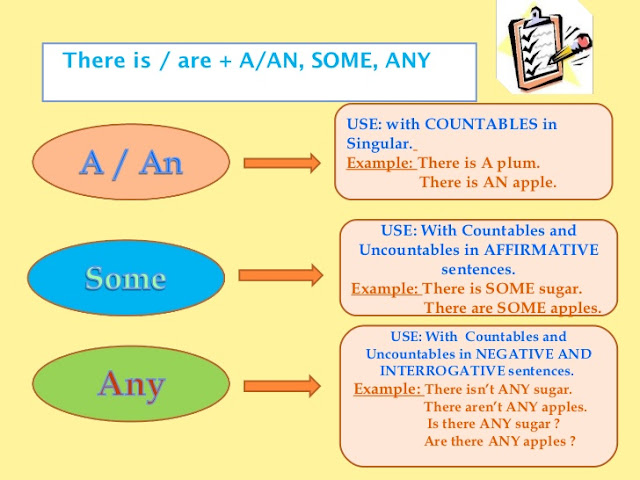THERE IS / THERE ARE
1. COMPLETE THE SENTENCES
1. There _____ thirty students in my class.
2. There _____ some books in my bag.
3. There _____ some computers in the library.
4. There _____ a blackboard in the classroom.
5. There _____ a CD player on our teacher´s desk.
6. There _____ some posters.
7. There _____ some dictionaries in the classroom.
2. COMPLETE THESE SENTENCES. USE THE NEGATIVE
1. ___________ any shopping centres in this town.
2. ___________any beaches in London.
3. ___________an American café here.
4. ___________a Hollywood in Spain.
5. ___________any rap CDs in this shop.
3. WRITE QUESTIONS AND SHORT ANSWERS
Example:
/ any Brazilian footballers in your favourite team?
Are there any Brazilian footballers in your favourite team? Yes there are.
1. / a skateboard park near here?
_____________________________
No, __________________________
2. / a Hollywood in Ireland?
_____________________________
Yes, __________________________
3. / any famous football teams in your town?
_____________________________
Yes, __________________________
4. / any interesting places near your house?
_____________________________
No, __________________________
5. / an English boy in your class?
_____________________________
No, __________________________
NOW, YOU CAN CHECK YOUR ANSWER.
ANSWERS
1.
1. There are thirty students in my class.
2. There are some books in my bag.
3. There are some computers in the library.
4. There is a blackboard in the classroom.
5. There is a CD player on our teacher´s desk.
6. There are some posters.
7. There are some dictionaries in the classroom.
2.
1. There aren´t any shopping centres in this town.
2. There aren´t any beaches in London.
3. There´s isn´t an American café here.
4. There´s isn´t a Hollywood in Spain.
5. There aren´t any rap CDs in this shop.
3.
1. Is there a skateboard park near here? No, there isn´t.
2. Is there a Hollywood in Ireland?
Yes, there is.
3. Are there any famous football teams in your town?
Yes, there are.
4. Are there any interesting places near your house?
No, there aren´t.
5. Is there an English boy in your class?
No, there isn´t






 Do you
Do you







